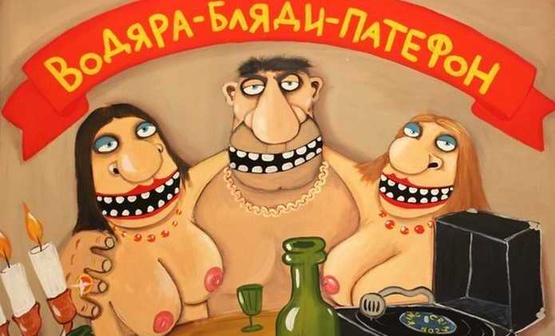Many observers view the behavior of Russians today as a revival of “homo sovieticus,” the special kind of human being the communists created over the course of decades. But they are wrong, Igor Yakovenko says. What is on display now is not that anthropological type but rather a new phenomenon altogether, “homo putinus.”
In a commentary on Novy region-2, the Ukrainian commentator argues that a quarter century after the collapse of the Soviet Union, the real “homo sovieticus” or “sovok” is “dead.” The social system that gave rise to that anthropological type is gone. Both have been replaced.
“Homo putinus or ‘the Putin man’ is formed by three factors,” Yakovenko says, “television, consumption and the total extermination of any norms, from moral and legal to linguistic and scholarly,” a situation which leads its exemplars to shamelessly, even proudly do what homo sovieticus was typically more embarrassed about.
For example, “homo putinus writes denunciations openly; it never comes into his head to think that he is doing something not quite right.” In the times of the USSR, in contrast, homo sovieticus often would do the same thing but without being especially proud of it or willing to claim that he or she was right to do it.
Among the examples of the behavior of the typical “homo putinus” he gives, perhaps the most striking concerns how the press secretary of the Moscow subway system reacted after a man jumped down onto the tracks to rescue a woman who had fallen there and who was at risk of being killed by an oncoming train.
Instead of suggesting the man was a hero for doing so, the press secretary said that the authorities should fine the man 30,000 rubles (500 US dollars) because “what he had done was a serious violation of the rules.” He should have known that the best course for the woman was to lie down in between the tracks and let the train run over her head.
“The idiot who serves as press secretary in the subway system apparently can’t get it into his blockhead that first of all ordinary citizens simply have nowhere to find out about the rules of behavior in extreme situations and second that the attempt to help someone near who is in trouble is how people should behave; condemning someone for doing that is moral ugliness.”
Another example Yakovenko provides which makes the contrast between “homo putinus” and “homo sovieticus” even clearer is the following: “The Soviet elite lived several times better than the people,” but it didn’t flaunt its privileges. Instead, it typically acted as if “it was necessary to conceal this from people.”
But in an utterly “shameless” way, “homo putinus “lives already several orders more richly [but] flaunts its luxuries” even when the cost of any particular item “exceeds the budget of a small city.” The “homo sovieticus” “committed many stupidities and vulgarities but as a rule did so secretly. “Homo putinus” does the same thing but “openly and even with the help of selfies seeks to ensure that about his vulgarities as many people as possible know.”
“Shamelessness is thus one of the key distinctions of the current [Russian] population from the soviet one,” the Ukrainian commentator says.
This is manifested in another way as well, he points out. “Homo sovieticus” living behind the iron curtain “sincerely believed that he lived well and that all the rest of the world was suffering in a capitalist and colonialist hell.” The Harvard Project which interviewed thousands of Soviet displaced persons after World War II documented that.
But “the homo putinus,” who “has access to all information” with two-thirds of the population having access to the Internet and who faces a state machine that is incomparably smaller than that of the USSR, nonetheless servilely falls in line as sometimes “homo sovieticus” did not.
When Khrushchev raised food prices in 1962, the people of Novocherkassk rose up and had to be suppressed by tanks. But today, “homo putinus” tolerates in a timid way not only the destruction of foodstuffs, the reduction or elimination of pension benefits, and an ever harsher life without protest. “Homo sovieticus,” he suggests, would not.
This “voluntary striving for slavery even when one has access to information and the absence of a critical level of force are also characteristics of homo putinus,” Yakovenko says. But he urges that this anthropological type be studied now because, he suggests, it won’t last nearly as long as “homo sovieticus” did.


